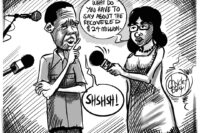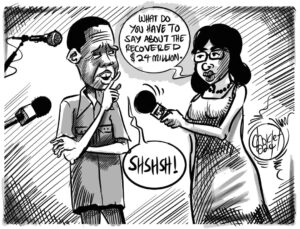AN AUDIT Report for the financial year ended 2018 has revealed that the University of Zambia owes ZRA, NAPSA and Workers Compensation over K2.8 billion in statutory obligations.
And the report has revealed that there were 30,657 favourable changes to student results without supporting documentation in 2018.
Meanwhile, the audit report has revealed that UNZA Vice-Chancellor Professor Luke Mumba has been paid a special allowance totalling K111,832 from September 2016 which is not in line with his terms of service.
This is according to a review letter signed off by Director – Public Debt & Investment Audits Rinniah Zulu on behalf of the Auditor General, detailing the findings by Grant Thornton who were subcontracted to do the audit.
The findings of the preliminary report revealed that UNZA accumulatively owed ZRA K1,607,660,000, NAPSA K1,201,980,000 and Workers Compensation K9,800,000 from 2013 to 2018.
“A review of records at the University revealed that amounts totalling K2,819,440,000 were deducted from the employees’ emoluments as Pay As You Earn, NAPSA and Workers Compensation during the period under review…However, these amounts had not been remitted to ZRA, NAPSA and Workers Compensation as of 31st December 2018,” the report read, stating that there was a risk of penalties and interest charges as well as increased government domestic debt.
But the UNZA management blamed this debt on government’s failure to adequately fund the institution.
“The auditor’s observation is noted. Failure to pay statutory obligations as and when they fall due is as a result of liquidity problems. As stated in your analysis, Government funding to the University is below operational costs rendering the University incapacity to dismantle statutory obligations. However, the University anticipates that most of its debt shall be liquidated by the Government of Zambia as per the Public Universities New Financing Strategy Cabinet memo of 2017. In December 2018 treasury released K23million for dismantling of arrears. In 2019 a total of K20.9 million was released towards dismantling of arrears. Evidence is available for verification,” read management’s response.
And the audit revealed that there were over 30,000 favourable changes to students’ results without proper justification.
“According to the University procedures on results management, entry of results on the Students Information System is done by authorised personnel who have been appointed to enter results. After results are entered, respective schools will meet to review and moderate the results where possible and then the Board of Examiners will also review and moderate where possible as well. The Board of Examiners will then print the results to be submitted for Senate’s approval. The Senate Committees reviews the results and produce a publication list that is approved by the Vice Chancellor. The results are published and student are given a two-week window period to appeal. All successful appeals will be amended after approval of the Vice Chancellor. The following was however observed; Favourable Moderation to Students Results without Supporting Documentation,” the audit read.
“A review of the system logs for the years 2015 to 2017 revealed that there were thirty thousand six hundred and fifty-seven (30,657) favourable changes to student results. As of November 2019, no supporting documentation to support the above changes to students’ results were availed for audit. (Schedule IT15).”
But management blamed this on a system glitch.
“The system was designed to auto-save in real-time as results are being keyed in by the user. A review of the schedule indicates that a number of records were as a result of the auto-save function. Furthermore, we are limited to provide appropriate answer to the query because the log in Schedule IT15 did not have adequate information to indicate the stage at which the log was produced in the results management process. Results can be changed at four stages (Departmental, School, Senate and Appeal) with supporting documentation. In addition, a log is a track of changes to the record and therefore an appropriate conclusion would have been drawn if the results in the system were compared with the publication list,” read management’s justification.
Meanwhile, the audit revealed that 4,070 results were changed from a higher mark to a lower mark while 7,938 results were changed from having a mark to null.
“An analysis of the results revealed that during the period under review, four thousand and seventy (4,070) results were changed from a higher mark to a lower mark while, seven thousand nine hundred and thirty-eight (7,938) results were changed from having a mark to a NULL,” the report read.
However, in its response, management said it could not provide an appropriate answer because the log being cited did not have adequate information indicating at which stage it was produced in the management process.
“On the 4,070 students, we are limited to provide appropriate answer to the query because the log in Schedule IT18 did not have adequate information to indicate the stage at which the log was produced in the results management process. Results can be changed at four stages (Departmental, School, Senate and Appeal) with supporting documentation. In addition, a log is a track of changes to the record and therefore an appropriate conclusion would have been drawn if the results in the system were compared with the publication list,” read management’s response.
“On the 7,938 students, the change of results was not effected in the system. The system is designed to auto-save in real-time and the users only logged in the system but did not change any results.”
Meanwhile, the audit findings revealed that Professor Mumba been paid a special allowance totalling K111,832 from September 2016 which is not in line with his terms of service.
“During the period September 2016 to December 2019, the Vice Chancellor was paid through the payroll a special allowance at the rate of K3,994 per month. It was however observed that allowance was not stipulated in the terms of contract for the Vice Chancellor and neither was it approved by Board. In this regard, amount totalling K111,832.00 that was paid for the period September 2016 to December 2018 was irregular,” read the report.
In its response, management said the money was meant for the Vice-Chancellor’s maid and chef.
“The special allowance paid to the Vice Chancellor relates to the salaries for a Maid and a Chef. However, due to limitations of codes in the payroll system, the special allowance code was used to pay this allowance to the Vice-Chancellor instead of creating a new code. The contract supporting the payment of allowance is available for verification,” the report read.
The audit also indicated that Prof Mumba and his deputy had received salary increments which were not supported by any documentation.
“The University entered into a contract of employment for the position of Vice Chancellor for a contract duration of five years running from 1st July 2016 at a salary of K68,390. A further scrutiny of the personal file and payroll revealed that in January 2017, the salary was adjusted to K75,229 indicating an increase of K6,839.00 However, no documentation was availed to support the salary increment of 10 per cent of the initial contract. The University entered into a contract of employment for the position of Deputy Vice Chancellor for a contract duration of four years running from 28th January 2016 at a salary of K61,219. In July 2016, the salary was adjusted by K1,426 to K62,645. Further in December 2016, the salary was adjusted by K6,264 to K68,909.50 representing a 10 per cent increment. However, no documentation was availed to support the adjustment by 12.5 per cent of the initial contract,” read the audit.
“On 8th June 2017, a contract of employment was signed for the position of Bursar with a contract period of four years (1st November 2016, to 31st October 2020) at an entry salary of K42,365. A scrutiny of the personal files and payroll revealed that in December 2016, one month after the engagement the salary was adjusted to K46,601.50 indicating an increase of K4,236.50. Further, in January 2017, arrears in amounts totaling K6,353.30 (salary arears of K4,236.50, Fuel K1,270 and housing K847.30) were paid. However, no documentation was availed to support the salary increment and payment of arrears for the salary. The University entered into a contract of employment for the position of Dean of Students for a contract duration of four years running from 1st March 2016 at a salary of K38,024. A further scrutiny of the personal files and payroll revealed that in December 2016, the salary was adjusted to K41,826.40 indicating an increase of K3,802.40. However, no documentation was availed to support the salary increment of 10 per cent of the initial contract.”
But in a brief response, management stated: “The contracts provide for amendments to the terms by Council. The documents supporting the adjustments are available for verification.”












